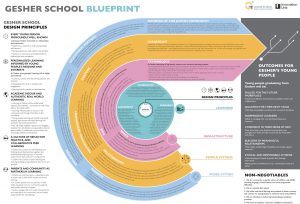Turning a Seed of an Idea Into Reality – The Role of Philanthropy
Kate Goldberg
Ever thought about what it means to turn the germ of an idea into something that creates real change in your community? We caught up with Kate Goldberg, Chief Executive at the Maurice Wohl Charitable Foundation, to talk about the role of foundations and the advice they would give to those dreaming of change, including Gesher.
Charlotte Billington
Thanks for your time today and for talking with us about the role that foundations can play in building communities and turning dreams into practice. To start could you describe a bit about the Wohl Foundation and the role you play in your community.
Kate Goldberg
Thanks so much. Itʼs a real privilege to be involved in the work of Gesher and to be part of The Bridgeʼs first edition.
The Wohl Foundation is one of the larger funders of the Jewish community in the UK. We fund work across the education, social and welfare sectors, towards ensuring the sustainability of Jewish and communal life here in the UK.
The position of foundations is a very privileged one. We are quite niche, as we focus mainly on the Jewish community. Weʼre able to take a balcony view of our community and watch the dancers on the floor, but we also all live, work and engage within the community. I often think about the Leonard Cohen quote, “Thereʼs a crack in everything, thatʼs how the light gets in. ” We see our role as both to underpin the core infrastructure, as well as to find the cracks and fund the light, in the shape of new and dynamic projects.
We all have a role to play in developing our community and ensuring that it is the best of us and the best for us.
Charlotte Billington
With that idea of ʻletting the light inʼ, what was it about Gesher School that made you want to invest in their dream?
Kate Goldberg
When the founders, Ali and Sarah, came to us we’d been funding Jewish schools for some time as well as working in the field of special needs. They brought a solution that bridged a real gap. They had clearly defined their target market – who they wanted to set the school up for – and they had a clear rationale – why it was needed and why their idea was the solution to that need.We saw strong leadership, with the passion, vision and determination to turn the dream into a reality. They had (and still have) the ability to vision, and they had the grit to roll their sleeves up and get the job done.
Charlotte
They will be the first to say that they werenʼt a polished product when they approached you. What do you think it was that has helped them turn the seed of their idea into practice?
Kate
Before we met today, I looked back at my notes and actually they came to us with much more than just the seed of their idea. They had already developed a clear sense of what needed to happen to achieve their ambition and they had already spoken with one other key funder who was showing interest. They had a good group of experienced professionals around them, and an advisory and trustee board already set up. Finally, they were also in the process of bringing in more expertise to fill gaps in knowledge.
Having said that, they were not the polished article and we, my colleague Howard Stanton in particular, spent an enormous amount of time helping them refine their ideas, develop a business plan around that, and how to engage with funders, to ensure they could fulfil their dreams.
Charlotte
Would you give them any advice for how to continue meeting their vision?
Kate
I think itʼs really important that their voice is amplified.
They should focus on shouting more about what it looks like to create a school where children with mild or moderate special educational needs are aspiring and thriving. Iʼm not sure how much Gesher is recognised in the wider Jewish or the SEN community yet.
Charlotte
And how do you start to bring a community into your vision and the journey travelled?
Kate
So there’s something about timing, consciousness, and a shift that makes you pay attention. I think that Ali and Sarah captured the timing piece really well, but they need to dig deeper into the consciousness of the community. Itʼs probably a communications effort, which is why I was also glad to take part in this interview and to hear about The Bridge.
They’re very, very good at writing to donors. This should be translated into creating good news stories for others in the Jewish Press and wider.
Charlotte
This has been such an insightful interview, thank you so much Kate. One final question I would like to end on. What advice would you give to others who want to take their seed of an idea and turn it into change?
Kate
I would ask a few questions of yourself:
- Do you have an achievable vision, that is a crack of light?
- Do you have what it takes to deliver?
- Do you have the right governance and people with the right expertise in place to help you?
- Are they pushing you and most importantly challenging your thinking?
- Do you have a plan for sustainability?
If the true answer is yes, then go for it!
Kate Goldberg is the Chief Executive of the Maurice Wohl Charitable Foundation.


